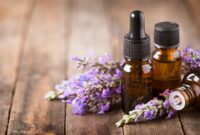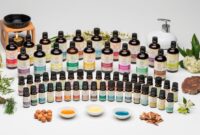Discover the transformative power of essential oils for skin care. Delve into their remarkable antibacterial, antifungal, anti-inflammatory, and antioxidant properties, and unlock the secrets to achieving a radiant, healthy complexion.
Our comprehensive guide provides in-depth insights into the benefits of essential oils, their safe and effective use, and tailored solutions for specific skin concerns. Prepare to embark on a journey of rejuvenation and embrace the transformative power of nature’s botanical treasures.
Essential Oils for Different Skin Types
Essential oils are natural compounds extracted from plants that have been used for centuries in skincare. They offer a wide range of benefits, including moisturizing, soothing, and protecting the skin. However, it’s important to choose the right essential oils for your skin type to ensure optimal results.
Here is a table summarizing the most suitable essential oils for different skin types:
| Skin Type | Suitable Oils | Benefits |
|---|---|---|
| Oily Skin | Tea Tree Oil, Lavender Oil, Lemon Oil | Antibacterial, anti-inflammatory, and regulating sebum production |
| Dry Skin | Rosehip Oil, Jojoba Oil, Avocado Oil | Moisturizing, nourishing, and protecting the skin’s barrier |
| Sensitive Skin | Chamomile Oil, Calendula Oil, Germanium Oil | Soothing, calming, and reducing inflammation |
| Combination Skin | Grapefruit Oil, Bergamot Oil, Frankincense Oil | Balancing, regulating sebum production, and improving skin texture |
| Mature Skin | Frankincense Oil, Myrrh Oil, Rose Oil | Anti-aging, reducing wrinkles, and improving skin elasticity |
Benefits of Essential Oils for Skin Care

Essential oils are natural plant extracts that have been used for centuries for their therapeutic properties. In recent years, they have become increasingly popular for skin care due to their antibacterial, antifungal, anti-inflammatory, and antioxidant properties.
Essential oils can help to improve skin health in a number of ways. For example, they can help to:
- Reduce inflammation
- Kill bacteria and fungi
- Protect against free radical damage
- Promote cell regeneration
Some of the most popular essential oils for skin care include:
- Tea tree oil:Tea tree oil is a powerful antibacterial and antifungal agent. It can help to treat acne, athlete’s foot, and other skin infections.
- Lavender oil:Lavender oil is known for its calming and soothing properties. It can help to reduce inflammation and promote relaxation.
- Chamomile oil:Chamomile oil is another calming and soothing oil. It can help to reduce inflammation and irritation.
- Frankincense oil:Frankincense oil is a powerful antioxidant. It can help to protect the skin from free radical damage and promote cell regeneration.
- Rosehip oil:Rosehip oil is a rich source of vitamins A and C. It can help to improve skin elasticity and reduce wrinkles.
How to Use Essential Oils for Skin Care

Incorporating essential oils into your skin care routine can enhance your skin’s health and appearance. However, it’s crucial to use them safely and effectively to avoid potential adverse reactions.
Methods of Application
There are several methods to apply essential oils for skin care:
- Direct Application:Certain essential oils, such as lavender or tea tree oil, can be applied directly to the skin for localized treatment of minor skin concerns. However, it’s important to note that not all essential oils are suitable for direct application due to their potency.
- Dilution in Carrier Oils:Most essential oils need to be diluted in a carrier oil, such as jojoba, coconut, or almond oil, before applying them to the skin. This helps reduce the risk of skin irritation and ensures even distribution.
- Diffusion:Essential oils can also be diffused into the air using an aromatherapy diffuser. This method allows the oils to be inhaled, providing benefits such as stress relief, improved sleep, and skin rejuvenation.
Guidelines for Safe and Effective Use, Essential oils for skin care
To ensure safe and effective use of essential oils for skin care, follow these guidelines:
- Always Dilute:Dilute essential oils in a carrier oil before applying them to the skin. The recommended dilution ratio varies depending on the oil and the intended use.
- Patch Test:Before using any essential oil on a large area of skin, perform a patch test on a small area of the inner forearm. Wait 24 hours to observe any reactions.
- Avoid Sun Exposure:Some essential oils, such as citrus oils, can increase skin sensitivity to sunlight. Avoid using them before sun exposure.
- Pregnancy and Children:Pregnant women and children should consult with a healthcare professional before using essential oils for skin care.
- Contraindications:Certain essential oils may have contraindications for specific health conditions. Always check with a qualified healthcare professional before using essential oils if you have any underlying health issues.
Essential Oils for Specific Skin Concerns: Essential Oils For Skin Care
Essential oils are concentrated plant extracts that have been used for centuries for their therapeutic properties. They are often used in skin care products to address a variety of skin concerns, such as acne, wrinkles, and dryness.
The benefits of essential oils for skin care are due to their antibacterial, anti-inflammatory, and antioxidant properties. These properties help to improve the skin’s appearance and health by reducing inflammation, killing bacteria, and protecting the skin from damage caused by free radicals.
Acne
Acne is a common skin condition that is caused by bacteria, inflammation, and excess oil production. Essential oils can help to address all of these factors, making them an effective natural treatment for acne.
- Tea tree oil is a powerful antibacterial and anti-inflammatory oil that can help to kill acne-causing bacteria and reduce inflammation.
- Lavender oil is a calming and soothing oil that can help to reduce redness and irritation.
- Frankincense oil is a regenerating oil that can help to heal acne scars and improve the skin’s overall appearance.
Wrinkles
Wrinkles are a natural part of the aging process, but they can be premature or more pronounced due to factors such as sun exposure, smoking, and poor diet. Essential oils can help to reduce the appearance of wrinkles by improving the skin’s elasticity and firmness.
- Rosehip oil is a rich source of vitamin C, which is essential for collagen production. Collagen is a protein that gives the skin its strength and elasticity.
- Frankincense oil is a regenerating oil that can help to repair damaged skin cells and improve the skin’s overall appearance.
- Myrrh oil is a toning oil that can help to tighten the skin and reduce the appearance of wrinkles.
Dryness
Dry skin is a common problem that can be caused by a variety of factors, such as cold weather, low humidity, and harsh skin care products. Essential oils can help to moisturize and soothe dry skin, leaving it feeling soft and smooth.
- Jojoba oil is a plant-based oil that is very similar to the sebum that is naturally produced by the skin. It can help to moisturize and protect the skin without clogging pores.
- Avocado oil is a rich source of vitamins A, D, and E, which are essential for healthy skin. It can help to moisturize and nourish dry skin.
- Lavender oil is a calming and soothing oil that can help to reduce inflammation and redness.
DIY Essential Oil Skin Care Recipes
Harness the therapeutic properties of essential oils by crafting your own skincare products. These recipes combine the power of natural ingredients to nourish, rejuvenate, and revitalize your skin.
When selecting essential oils, consider your skin type and specific concerns. Dilute essential oils in a carrier oil, such as jojoba, almond, or coconut oil, before applying them to the skin.
DIY Facial Serum
| Ingredients | Instructions | Benefits |
|---|---|---|
| 5 drops lavender essential oil | Mix all ingredients in a 10ml dropper bottle. Shake well before use. | Calming, anti-inflammatory, reduces redness |
| 3 drops frankincense essential oil | Apply 2-3 drops to cleansed skin, morning and night. | Anti-aging, promotes cell regeneration, reduces scars |
| 2 drops rosemary essential oil | Antioxidant, improves circulation, reduces puffiness | |
| 10ml carrier oil |
Safety Considerations

Essential oils are highly concentrated plant extracts, so it’s crucial to use them safely to avoid potential risks and side effects.
Always dilute essential oils with a carrier oil, such as jojoba, coconut, or almond oil, before applying them to the skin. This helps prevent skin irritation or allergic reactions.
Storage and Disposal
- Store essential oils in dark glass bottles away from light and heat.
- Keep essential oils out of reach of children and pets.
- Dispose of essential oils properly by mixing them with coffee grounds or salt and throwing them away in a sealed container.
Epilogue

In conclusion, essential oils offer a myriad of benefits for skin care, empowering you to address a wide range of concerns and achieve your desired complexion. Embrace the wisdom of nature and incorporate these potent oils into your skincare routine for a radiant, healthy glow that will turn heads.
Common Queries
Can essential oils be used directly on the skin?
While some essential oils can be applied directly to the skin, it is generally recommended to dilute them in a carrier oil, such as jojoba or coconut oil, to minimize the risk of irritation.
How often should I use essential oils on my skin?
The frequency of use depends on the specific essential oil and your skin type. It is advisable to start with a low concentration and gradually increase it as needed.
Are essential oils safe for all skin types?
While essential oils are generally safe for most skin types, some individuals may experience sensitivity or allergic reactions. It is important to do a patch test before applying any essential oil to a large area of skin.


